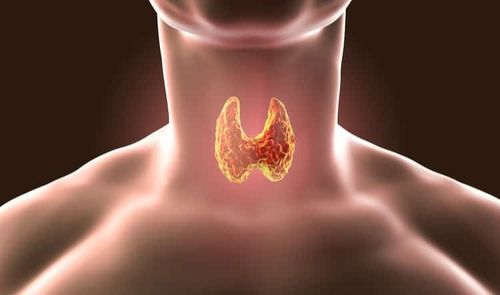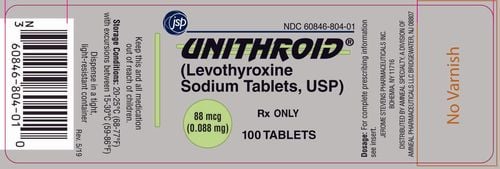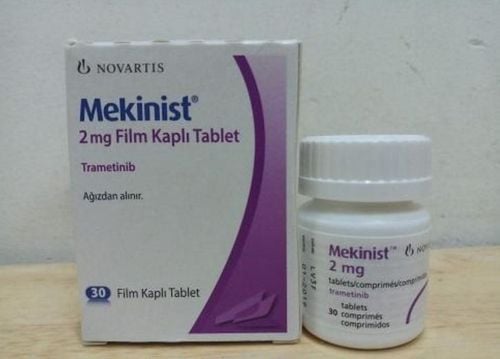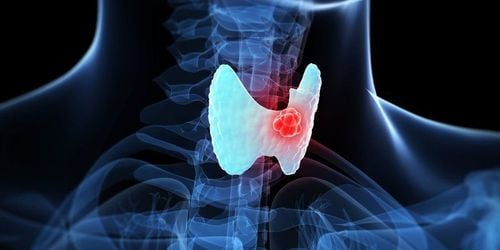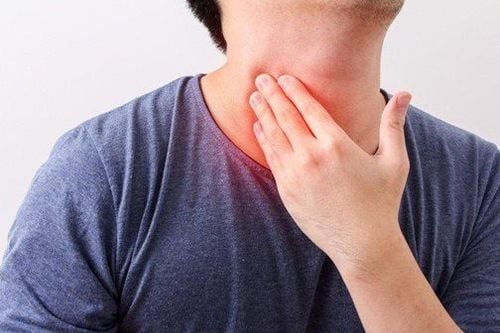This is an automatically translated article.
Radioiodine therapy is a common way to treat differentiated forms of thyroid cancer (papillary and follicular). It's not the kind of radiation you might associate with cancer treatment. Radioactive iodine is given orally (pills), when it enters the body, it works by killing cancer cells.
1. Treatment of thyroid cancer with radioactive iodine therapy
Thyroid has the ability to absorb almost all iodine when it is put into your body. Therefore, radioactive iodine - Radioiodine (RAI, also known as I-131) can be used to treat thyroid cancer. Radioiodine - Radioiodine collects mainly in thyroid cells, where radiation can destroy the thyroid gland and any other thyroid cells (including cancer cells) that take up iodine, with little effect to the rest of your body. The radiation dose used here is much stronger than the dose used in radiographic scanning.
Oral radioiodine can be used to remove (destroy) any thyroid tissue that cannot be removed with surgery or to treat certain types of thyroid cancer. metastasis to the lymph nodes as well as other parts of the body.
Initial radioactive iodine treatment can be done at any time, but is usually 6 weeks to 6 months after surgery. The reason for the delay may be that your doctor wants to see how you're doing after surgery before deciding if radioactive iodine is needed.
Radioactive iodine therapy helps people live longer if they have papillary or follicular thyroid cancer (differentiated thyroid cancer) that has spread to the neck or other parts of the body. But the benefits of radioactive iodine therapy are less obvious for people with small thyroid cancers that don't appear to have spread, which can often be completely removed with surgery. So, depending on your actual condition, you should discuss the risks and benefits of radioactive iodine therapy with your doctor. On the other hand, radioactive iodine therapy cannot be used to treat medullary (undifferentiated) and medullary thyroid carcinomas because these cancers do not use iodine.
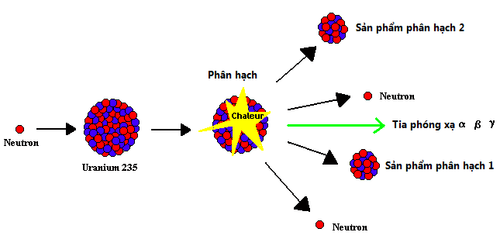
Liệu pháp iốt phóng xạ giúp người bệnh sống lâu hơn nếu họ bị ung thư tuyến giáp thể nhú hoặc thể nang
2. Subjects of radioactive iodine therapy
Radioactive iodine therapy is usually only considered for people with stages 2-4 of thyroid cancer, which is considered to be at higher risk. People who are at low risk of relapse usually do not need treatment with radioactive iodine therapy. This includes patients who:
People with only one cancerous nodule without 'aggressive features' Under 45 years old No family history of thyroid cancer Have stage I thyroid cancer
3. Prepare for radioactive iodine therapy
For radioactive iodine therapy to be most effective, you must have a high level of thyroid-stimulating hormone (TSH or thyrotropin) in your blood. This hormone is what causes thyroid tissue (and cancer cells) to absorb radioactive iodine. If your thyroid has been removed, there are several ways to raise your TSH level before receiving radioactive iodine treatment:
One way is to stop taking your thyroid hormone medication for a few weeks. This causes very low levels of thyroid hormone (hypothyroidism), causing the pituitary gland to secrete more TSH. This intentional hypothyroidism will be temporary, but it often causes symptoms such as fatigue, depression, weight gain, constipation, muscle pain, and decreased concentration. Another way is to inject (inject) thyrotropin (Thyrogen), which can cause the thyroid hormone to be withheld for a long time. This medication is taken daily for 2 days, followed by radioactive iodine on day 3. Most doctors recommend following a low-iodine diet for 1 or 2 weeks before treatment. This means avoiding foods that contain iodized salt and red dyes.
Low Iodine Diet:
Unlimited Foods: You can eat as many of these foods as you like as their iodine content is very low: Fruits and vegetables including potatoes, meat, common table salt and sea salt, fresh bread, dry rice and pasta, non-dairy foods such as Vitalite, Pure and non-dairy Flora, olive oil, vegetable and seed oils, water, soft drinks, carbonated beverages, fruit juices and alcoholic beverages, non-dairy teas and coffees, milk alternatives such as coconut, rice, almonds and soy milk avoid those that contain the ingredient carrageenan (as it is derived from seaweed sea), dark and simple chocolate with 70% cocoa or more, French fries Limited foods: You can eat small amounts of these foods because they have a modernized amount of iodine:milk approx. 5-7 teaspoons a day (25ml), butter one teaspoon (5g) daily, cheese 25g (1 ounce) per week, dairy products such as yogurt and milk cream 1 time per week, 1 egg per week, egg-containing products spoiled mayonnaise, custard, fresh egg pasta, egg fried rice, Yorkshire pudding, pancakes Foods to avoid: Reasons you shouldn't eat these foods because they are high in iodine: fish, seafood, seaweed sea, kelp and laverbread, raw greens like spinach and broccoli, cakes and cookies made with eggs or butter, milk and white chocolate, fast food and restaurant food because of their ingredients not known and may contain iodine, iodized salt and pink Himalayan salt from outside the UK, vitamin and mineral supplements, nutritional supplements and cough mixes (unless prescribed by a medical team) , for example vitamin D )

Bệnh nhân nên tuân theo chế độ ăn ít iốt trong 1 hoặc 2 tuần trước khi điều trị
3. Risks and side effects of radioactive iodine therapy
Your body will be radioactive for some time after you receive radioactive iodine therapy. However, this depends on the dose of radiation used and the medical facility in which you are being treated. But the best thing to do is that you may need to stay in the hospital for a few days after treatment, in a special isolation room to prevent other people from getting radiation. However, in certain cases, some people may not need to be hospitalized. When you are allowed to go home after treatment, you will be given instructions on how to protect others from radiation exposure and how long you need to take these precautions. These guidelines may vary slightly by treatment center. Make sure you understand the instructions before you leave the hospital.
Short-term side effects of thyroid cancer treatment with radioactive iodine therapy:
Neck pain and swelling Nausea and vomiting Swelling and pain in the salivary glands Dry mouth Taste changes Chewing gum or sucking Hard candy can help treat salivary gland problems.
Radiation therapy also reduces tear formation in some people, leading to dry eyes. If you wear contact lenses, talk to your doctor about what you can do to improve your condition.
Men who receive a total dose of large amounts of radiation due to accumulation from multiple treatments with radioactive iodine may have a lower sperm count or may be a risk factor for infertility. however this is quite rare. Radioactive iodine can also affect a woman's ovaries, and some women may have irregular periods for up to a year after treatment with this compound. Many doctors recommend that women avoid becoming pregnant for 6 months to a year after treatment. In addition, no adverse effects were noted in children born to parents who received radioactive iodine to treat thyroid cancer in the past.
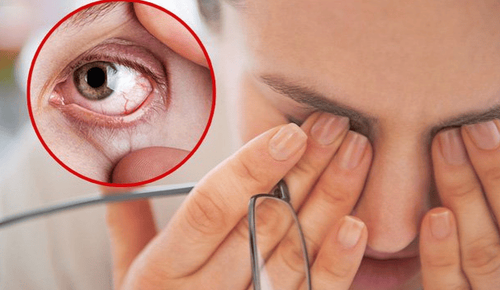
Điều trị bằng chất phóng xạ cũng làm giảm sự hình thành nước mắt ở một số người, dẫn đến khô mắt
Both men and women who have received radioactive iodine treatment may have a slightly increased risk of developing leukemia, stomach cancer, and salivary gland cancer in the future. Doctors disagree about exactly how much this increased risk, but most of the largest studies have found it to be an extremely rare complication.
Talk to your healthcare team if you have any questions about the possible risks and benefits of this treatment.
Early cancer screening is considered a perfect measure in the timely detection and treatment of all types of cancer. Reduce the cost of treatment and especially reduce the mortality rate in patients. Vinmec International General Hospital always deploys and introduces to customers Early cancer screening at Vinmec - Peace of mind to live well to help with gene testing, imaging diagnostics, testing of biological markers to detect tumors Soon. Vinmec International General Hospital has many packages of early cancer screening.
Only one gene test can assess the risk of 16 common cancers in both men and women (lung cancer, colorectal cancer, breast cancer, pancreatic cancer, neck cancer) uterus, stomach cancer, prostate cancer,....) Early detection of early signs of cancer through imaging, endoscopy and ultrasound. The operation is simple, careful and accurate. A team of well-trained specialists, especially in oncology, are capable of handling cancer cases. With facilities, advanced and modern medical equipment and a team of doctors with deep expertise and experience. At Vinmec, the examination process becomes fast with accurate results, saving costs and time for patients.
In April & May 2021, when there is a need for thyroid cancer examination and treatment at Vinmec Times City International General Hospital, customers will enjoy double incentives:
- Free specialist examination and 50% off Thyroid Cancer Screening Packages such as:
+ Standard Thyroid Screening Package
+ Advanced Thyroid Screening Package
+ Special Thyroid Screening Package
- 50% off cost for customers with only post-examination treatment. The program is limited to the corresponding technique of each hospital and to customers who perform this treatment technique for the first time at Vinmec.
Please dial HOTLINE for more information or register for an appointment HERE. Download MyVinmec app to make appointments faster and to manage your bookings easily.
References: cancer.org




